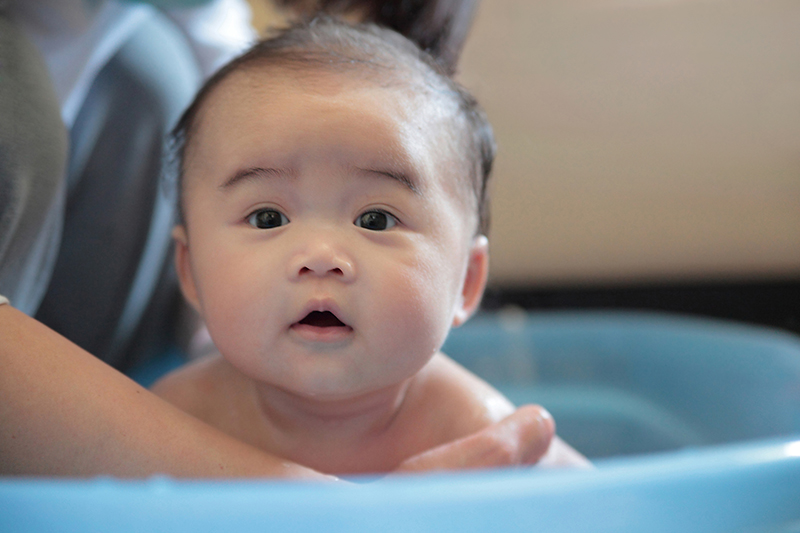Families For Life | Burns Prevention in Your Home-Babies

Burns prevention depends on keeping your child away from anything hot and supervising him closely whenever he’s near things that can burn.
Burns and basic burns prevention
A burn is an injury to the skin that happens from touching something hot.
Supervision is the only reliable way to prevent burns.
Always supervise your child:
in the kitchen
around hot surfaces like stoves, ovens, microwaves, heaters, irons and other appliances
around outside hazards like barbecues, camp fires and exhaust pipes.
Seek immediate medical help from a doctor, hospital or medical centre if a child’s burn is the size of a 20-cent piece or larger, if the burned skin looks raw, angry or blistered, or if the pain persists or is severe. Call an ambulance if the burn is larger than the size of the child’s hand, or is on the face, neck or genitals. See more in our burns first aid article.
Preventing burns indoors
You can prevent burns indoors by being aware of common risks and avoiding them.
Kitchen
Avoid leaving the kitchen unattended if you’re using pots and pans, kettles, toasters, sandwich presses, slow cookers, rice cookers and other appliances.
Keep your child’s play areas away from your kitchen.
Use the back burners on the stove first. Turn handles on pots and pans towards the back of the stove.
Install a guard around the hot plates on your stove.
Ensure appliance cords don’t hang down within reach of your child. Use appliances with short cords.
Living and family areas
Securely attach guards around heaters to discourage your child from standing too close.
Securely attach a fixed fire guard around any open fires, smouldering ashes, or electric or gas heaters.
Save ironing for when your child isn’t around. You could also put your child – or yourself – in a playpen while you iron.
Install cool-to-touch ovens and heaters where possible.
Keep clothes, toys, curtains and other flammable items at least 1 m away from heaters.
Use placemats rather than tablecloths. If your child tugs on a tablecloth, it can bring hot food and drinks down on top of them.
Set up and use treadmills away from your child. Unplug treadmills when you’re not using them. Treadmills can cause serious friction burns.
Bedrooms
Dress your child in close-fitting nightwear and dressing gowns with ‘low fire danger’ labels.
Try to keep bedside lamps and light bulbs out of reach, or unplugged, until your child is old enough to understand that they burn.
Don’t give hot water bottles or heat packs to babies and young children. If you use these products to warm up a bed, always remove them before your child gets in.
General
Keep electrical cords out of reach of your child.
Turn electrical appliances off at power points if they're in low positions.
Always supervise your child carefully around any naked flames, like open fires, gas burners, incense burners and candles.
Lock matches, cigarette lighters and flammable liquids like methylated spirits up high and out of reach.
Always smoke out of the house and away from children. This also reduces your child’s exposure to harmful second-hand smoke.
Fires can start as a result of cooking accidents, smoldering cigarettes, electrical faults, candles, incense and children playing with lighters and matches.
You can develop and practise a plan in case there’s a fire in your home.
Preventing burns outdoors
You can prevent burns outdoors by being aware of common risks and avoiding them.
Outdoor cooking and heating
Brace or support gas heaters on patios so they can’t topple over.
Keep a close watch on your child while your barbecue is heating up, being used or cooling down. Some barbecues can keep their heat for hours.
Use only water to put out barbecue and camp fires, and rake ashes so they lose their heat more quickly. Embers, coals and ashes can stay hot for up to 8 hours after the fire has been buried under dirt or sand.
Supervise your child around camp fires, and don’t let your child walk around camp sites barefoot.
Don’t use accelerants like petrol and kerosene to light or reignite fires.
Other outdoor burn hazards
Keep your child away from exhaust pipes on cars and motor bikes. Exhaust pipes are easy to reach and can cause serious burns.
Check whether seatbelt buckles have heated up when the weather is hot.
Lock away tools like blow torches and soldering irons.
In hot weather, check metal playground equipment, especially slides. They can get hot enough to burn your child.
© raisingchildren.net.au, translated and adapted with permission
Explore more